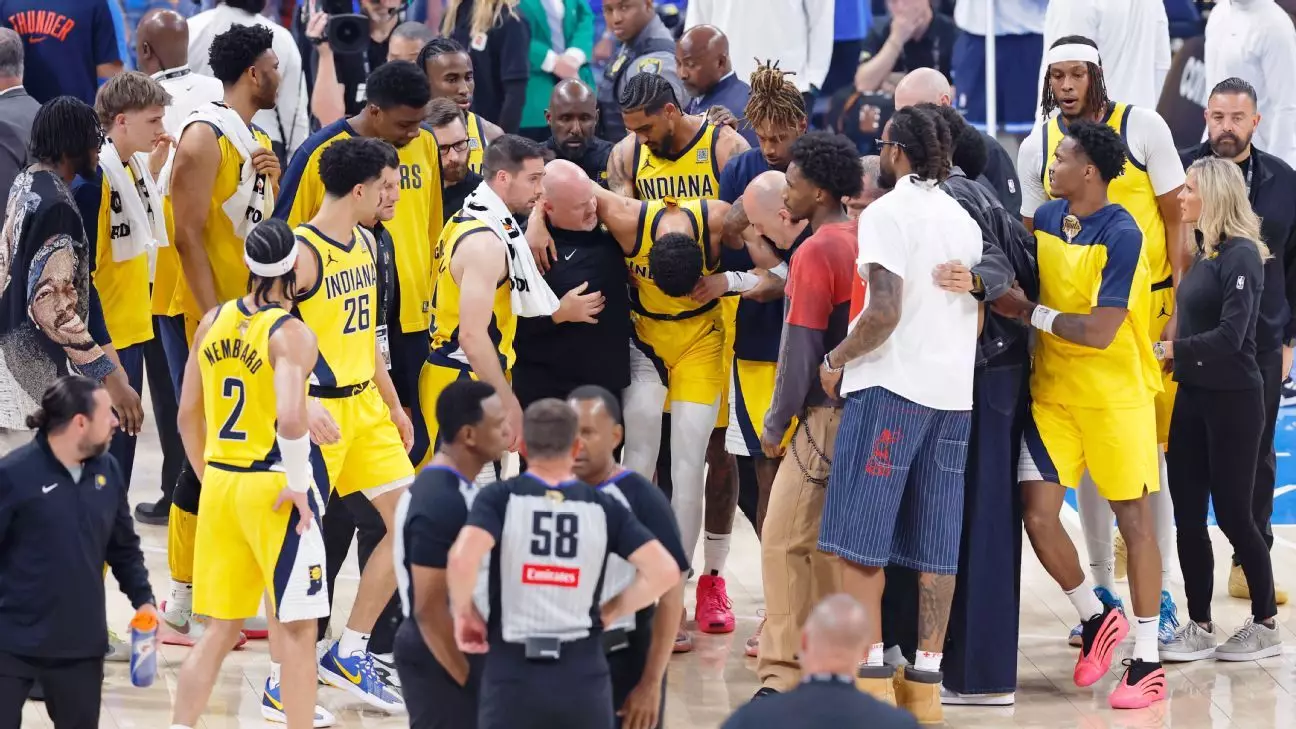In the world of professional sports, the line between dedication and folly is often blurred. Tyrese Haliburton, the Indiana Pacers star, epitomizes this complexity by choosing to play through a calf strain that ultimately culminated in a devastating Achilles tear during Game 7 of the NBA Finals. His emotional announcement acknowledging the injury feels like a battle cry for sports enthusiasts who often wrestle with the same dichotomy—what sacrifices are too great for the love of the game? Haliburton’s decision to continue despite the risks speaks volumes about his character, yet it raises more questions than it answers about the culture surrounding athlete risks.
When Haliburton expressed that he’d “do it again, and again after that, to fight for this city and my brothers,” it resonates with passion but also hints at a troubling acceptance of undue risk. How far should one go to exemplify loyalty or resilience? In a society that prizes grit, are we romanticizing the athlete’s pain without considering the long-term consequences? It’s inspiring to see such commitment to a team and a fanbase, yet the question looms: at what point does heroism transform into recklessness?
A Heartbreaking Moment
Haliburton’s injury came at a critical juncture, during a playoff series that had showcased his remarkable skill and composure. After leading the Pacers on an extraordinary journey, the abrupt end of his promising run serves as a potent reminder of the fragility of athletic success. Watching him crumble to the floor, unable to put weight on his leg, is an image that stings, not just for the player, but also for fans who had invested emotionally in the highs and lows of the season. It’s a moment that shatters dreams, not merely for Haliburton, but for the entire franchise, making us question the toll competitiveness can exact.
Haliburton’s words reflect an all-too-familiar emotional turbulence. He described his feelings as “shock” and “unfathomable frustration,” which many can relate to, especially in a world rife with disappointment. But can we really glorify an athlete’s sacrifices when they lead to such heart-wrenching outcomes? It’s reminiscent of the old adage, “no pain, no gain,” which begs the question of whether this mindset is genuinely productive in the long run or simply an excuse for systems that prioritize wins over the welfare of their players.
Rehabilitation and Reflection
As Haliburton embarks on a challenging rehabilitation journey, his candid acknowledgment of the emotional toll speaks volumes. “Feel like I’m rambling, but I know this is something I’ll look back on…,” he muses, demonstrating a level of self-awareness that many athletes overlook. The cliché, “you’ll come back stronger,” seems to betray the reality of his struggles—a reality that transcends the playful banter often seen in post-injury rhetoric.
While Haliburton’s statements resonate with a powerful sense of hope, they also represent a sobering truth about the psychological journey athletes undertake when faced with injuries. Rehabilitation isn’t just a physical trial; it’s an emotional labyrinth filled with fear, doubt, and frustration. When he declares, “I don’t ‘have to’ go through this, I get to go through this,” it’s a bravado that masks a deeper vulnerability. The only way forward is through, yet the weight of that journey can feel insurmountable, reminiscent of the mental struggles faced by athletes behind closed doors.
The Cultural Conundrum
Haliburton’s situation shines a spotlight on a broader cultural conundrum in sports: the valorization of martyr-like sacrifice among players. Is it truly noble to risk one’s career for the sake of glory? Or should we be advocating for a more prudent approach to health and wellness? The narrative often depicted in sports media glorifies the tough-guy mentality, yet it’s increasingly clear that this mindset could lead to catastrophic outcomes for the athletes themselves.
In championing grit and perseverance, are we failing to acknowledge the need for self-care and risk assessments in a high-stakes environment? Haliburton’s emotional outpouring serves as both a testament to his character and a cautionary tale that calls for an evolution of values within the sports culture. The time has come for a discussion that transcends mere heroics—one that celebrates balance, sustainability, and the long-term wellbeing of athletes like Haliburton, rather than fleeting moments of glory.


Leave a Reply